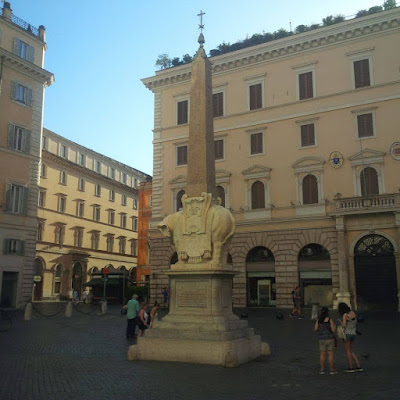I wasn’t struck
by the impact on France of the recent terror attacks until I got to Chambéry. It’s a lovely city: the Alps
provide a majestic backdrop, and the handsome shuttered buildings in the old
town are draped with the red and white flag of Savoie. Such were my thoughts as
I sat in the Place du Théâtre drinking a strong coffee. Then three soldiers in fatigues and
berets who looked as hard as nails walked past bearing automatic weapons. It
was a jarring reminder of France’s troubles.
Perhaps I should
have been prepared, though. While I was staying in a guesthouse in the Provençal wine village of Rasteau, a few hours
south of Chambéry, the owner told me that the number of foreign guests had gone through
the floor. They were afraid, she said. It was a shame, I agreed. And it really
is, for Rasteau is a wonderful place.
It’s hard to believe that Rasteau belongs
to the same country as Paris and Nice. It feels isolated from the stresses of
the outside world. Very little happens, and the chimes of the bell tower every
half hour seem designed to rouse the locals from their reveries. In the late
afternoon, when the baking August heat has slackened off a little, old men take
over the dusty square for games of pétanque. Other wizened figures sit on
benches to observe them.
Off the square is a no-frills bar,
the inside of which is likewise the preserve of elderly gentlemen. The drinks
list is eccentric. I wanted a glass of Rasteau’s Vin Doux Naturel (a delicious
and sweet local specialty similar to Port). They didn’t have any. The nearby post
office only does business in the morning and the grocery shop has irregular
opening hours. The bakery was shut because the owners had gone on holiday. You
wonder how the owners and employees of these establishments can possibly make a living.
I went to Rasteau because of its
wine. Its reds are concentrated and spicy. I spent hours wandering around
the arid and empty vineyards (the farmers were all on holiday, like the bakers).
The soil was dark brown, becoming lighter the nearer you got to the village.
Pudding stones, or galets, were
spread over the surface, in some cases covering whole rows. Massive bunches of
Grenache and Syrah grapes drooped from the vines, looking ripe enough to
harvest even at this early stage of the growing season.
At night the vineyards were so peaceful;
nothing was audible except for the relentless croaking of cicadas. On a ridge across
the flat and deserted plain I could see the orange lights of the wine villages
of Séguret, Sablet and
Gigondas. They stood out like beacons in the darkness, and I could almost
imagine I had stepped back into the past. For surely this night view has enthralled
moonlight walkers for centuries.











